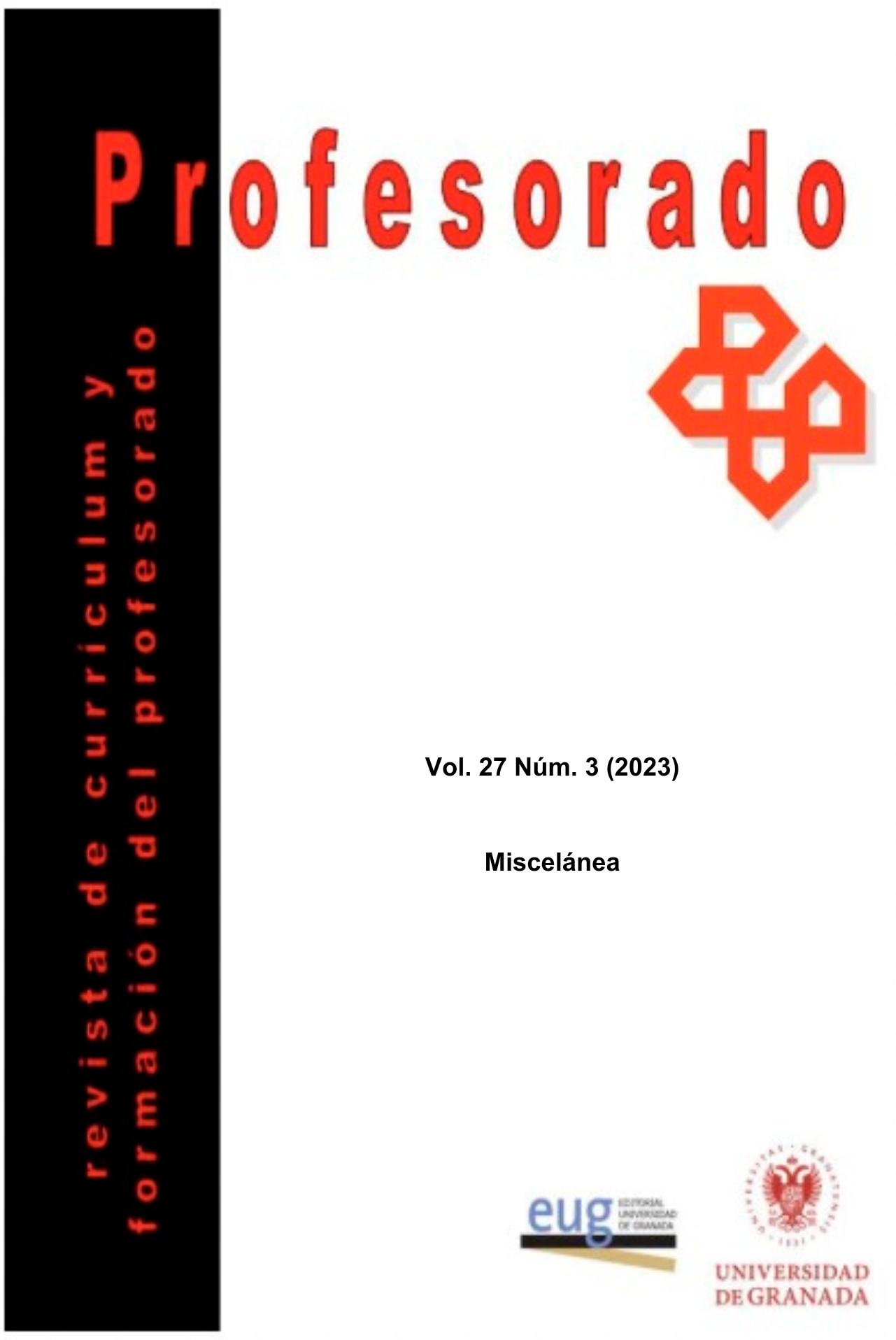Reflexión, implicación y sentido del aprendizaje: perspectiva del alumnado de formación de profesorado
DOI:
https://doi.org/10.30827/profesorado.v27i3.23489Keywords:
initial teacher education, grade students, engagement, mediation, reflection, sense of school learningAbstract
Students do not always clearly perceive the alignment between what they do or learn in university and within their personal and professional goals. One of the ways to get students engaged in training activities is to work on reflection. We understand reflection as a socially constructed process, mediated by instruments in particular learning activities. In this article we present the results of the implementation of an educational innovation to encourage reflection of Initial Teacher Education students in their first year of university with the support of two instruments: the minutes of meetings and the minutes of final reflection. We intend to know the general involvement of students in the subject, and the perception of which components from the innovation are the most valued for learning. We collected 274 responses from a questionnaire, and data throughout four focus groups. The results report a high involvement of students in the subject and indicate different functions of the two instruments to promote reflection: the minutes of meetings to scaffold planning and self-regulation processes of team work, and the minutes of final reflection to promote reflection on the learning outcomes and to get to know oneself better as a learner. The conclusions point out the importance of designing spaces and time for reflection before, during and after the different training activities, and taking advantage of the help of lecturers/professors and students themselves to scaffold reflective processes. We close with some recommendations for practice.
Downloads
References
Amerstorfer CM., & Freiin von Münster-Kistner C. (2021). Student Perceptions of Academic Engagement and Student-Teacher Relationships in Problem-Based Learning. Frontiers in Psychology, 12, 1-18. https://doi.org/10.3389/fpsyg.2021.713057
Benito, H., Llop, E., Verdaguer, M., Comas, J., Lleonart, A., Orts M., Amado, A., & Rostan, C. (2021). Multidimensional research on university engagement using a mixed method approach. Educación XX1, 24(2), 65-96. https://doi.org/10.5944/educXX1.28561
Blumenfeld, P., Fredricks, J., & Paris, A. (2004). School engagement: potential of the concept, state of the evidence. Review of Educational Research, 74, 59-109.
Christenson, S. L., Reschly, A. L., & Wylie, C. (2012). Handbook of research on student engagement. Springer Science.
Coll, C. (1988). Significado y sentido en el aprendizaje escolar. Refelexiones en torno al concepto de aprendizaje significativo. Infancia y aprendizaje 41, 131-142
Coll, C. (2018). Procesos de aprendizaje generadores de sentido y estrategias de personalización. En C. Coll (Coord.), Personalización del aprendizaje. (pp. 14-18). Graó.
Coll, C., & Falsafi, L. (2010). Learner identity. An educational and analytical tool. Revista de Educación, 353, 211-233.
Chan, C. K. Y., & Lee, K.K.W (2021). Reflection literacy: A multilevel perspective on the challenges of using reflections in higher education through a comprehensive literature review. Educational Research Review 32, 100376 https://doi.org/10.1016/j.edurev.2020.100376
Creswell, J. W. (2015). A concise introduction to mixed methods research. SAGE publications.
Dalsgaard, C. (2020). Reflective Mediation: Toward a Sociocultural Conception of Situated Reflection. Frontline Learning Research, 8(1), 1-15. https://doi.org/10.14786/flr.v8i1.447
Davis, E. A. (2003). Prompting middle school science students for productive reflection: Generic and directed prompts. Journal of the Learning Sciences, 12, 91-142.
DeSeCo (2005). La definición y selección de competencias clave. Resumen ejecutivo. http://www.deseco.admin.ch/bfs/deseco/en/index/03/02.parsys.78532.downloadList.94248.Download File.tmp/2005.dscexecutivesummary.sp.pdf
Fàbregues, S., & Paré, M-H. (2016). El grupo de discusión. En S. Fàbregues, M. Meneses, D. Rodríguez-Gómez, & M. H. Paré, Técnicas de investigación social y educativa (159-192). UOC.
Feixas, M., Engfer, D., Zellweger, F., Zimmermann, T., & Flepp, G. (2020). Degrees of reflection in academic development: Construction and application of a tool to assess critical reflection in portfolios and projects. Profesorado. Revista de Currículum y Formación de Profesorado, 24(2), 98-119. https://doi.org/10.30827/profesorado.v24i2.15227
Furberg, A. (2009). Socio-cultural aspects of prompting student reflection in Web-based inquiry learning environments. Journal of Computer Assisted Learning, 25, 397-409. https://doi.org/10.1111/j.1365-2729.2009.00320.x
Leinonen, T., Keune, A., Veermans, M., & Toikkanen, T. (2016). Mobile apps for reflection in learning: A design research in K-12 education. British Journal of Educational Technology, 47(1), 184-202. https://doi.org/10.1111/bjet.12224
Perrenoud, Ph. (2004). Desarrollar la práctica reflexiva en el oficio de enseñar. Profesionalización y razón pedagógica. Graó.
Schön, D. (1992). La formación de profesionales reflexivos. Hacia un nuevo diseño de la enseñanza y el aprendizaje de las profesiones. Paidós.
Solari, M. (2018). Reflexión del alumnado sobre el proceso de aprendizaje y sobre sí mismos como aprendices. Comunicación en el II Encuentro sobre personalización del aprendizaje y procesos de innovación educativa. Madrid (España), 16 y 17 de noviembre. https://ble.psyed.edu.es/wp-content/uploads/2019/01/Mesa-3-Reflexio%CC%81n-del-alumnado.pdf
Stewart, D. W., & Shamdasani, P. N. (2007). Focus groups: Theory and practice (2a ed.). Sage.
Veine, S., Anderson, M. K., Andersen, N. H., Espenes, T. C., Søyland, T. B., Wallin, P., & Reams, J. (2020). Reflection as a core student learning activity in higher education - Insights from nearly two decades of academic development. International Journal for Academic Development, 25(2), 147-161. https://doi.org/10.1080/1360144X.2019.1659797
Wertsch, J. V. (1991). Voices of the mind: A sociocultural approach to mediated action. Harvard University Press.















